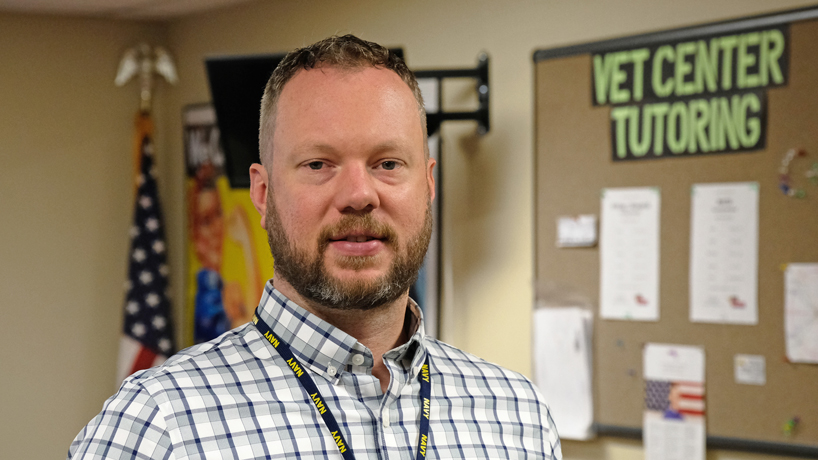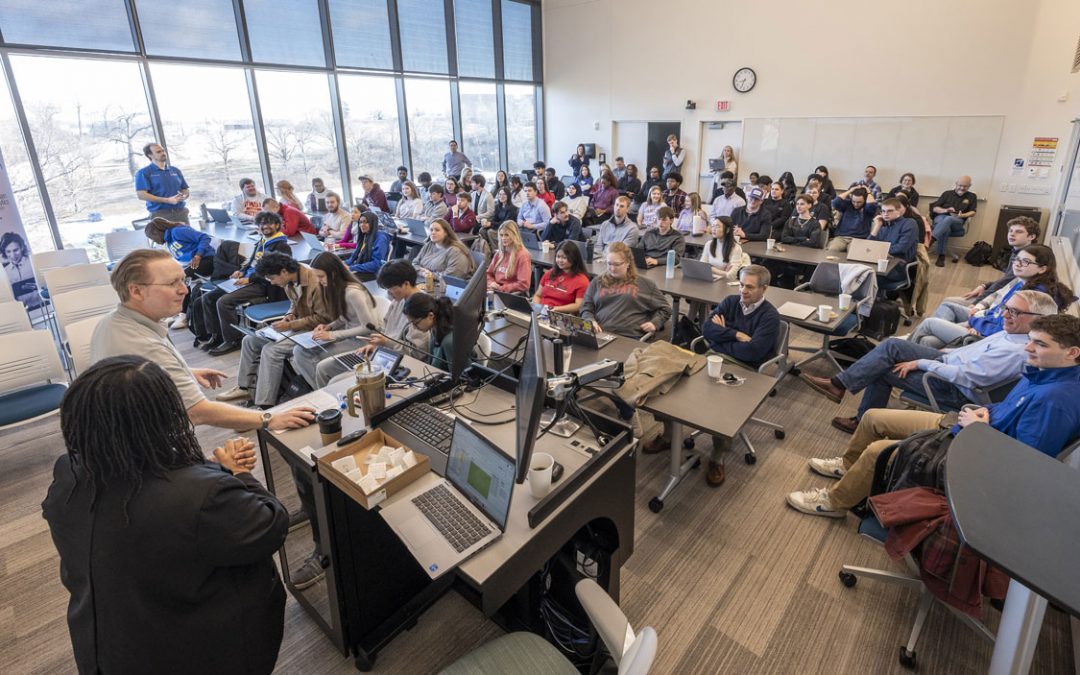
Joshua Perschbacher stepped into his role overseeing the UMSL Veterans Center on Jan. 8. Nearly 50 percent more student veterans are now enrolled at the university compared to when the center was first established in the fall of 2012. (Photo by August Jennewein)
Joining the military wasn’t part of Joshua Perschbacher’s game plan when he graduated from college about a decade ago. He’d landed a good job working at a bank, and his employer had even agreed to pay his way toward an MBA.
Then the 2008 financial crisis hit, and Perschbacher’s future took an abrupt turn.
“They let a bunch of us go, and by March I was back working at the mall, at Gap Outlet, and at Jimmy John’s like I did in college,” he says. “And I thought, ‘This isn’t a career. I need to do something different.’ So I went and enlisted in the Navy at that point.”
Beginning in 2009, he served two deployments out of San Diego on the USS Carl Vinson, an aircraft carrier. After leaving the military in 2013, the Illinois native moved to the Chicago area where he started working and pursuing a graduate degree in higher education, building on his undergraduate education degree.
As he did so, he got involved with efforts to help military veterans prepare for civilian employment – and the need for support through that transition particularly sparked Perschbacher’s interest.
“Everybody is just being hammered by their chain of command, ‘Why are you getting out of the Navy? There’s no jobs out there for you, and you just need to stay in the military,’” he explains. “And I just thought, ‘I’d like to be that lighthouse on the other shore, saying, “Hey, if you guys want to come, there are things here.”’ If they stay in the military, I want it to be because they have a heart for it, not because they’re too scared to get out.”
That passion for helping other veterans find their best path forward has now led Perschbacher to the University of Missouri–St. Louis, where he is the director of the UMSL Veterans Center. Before stepping into the job earlier this month he served in a similar role in the veterans office at Northeastern Illinois University.
His arrival comes on the heels of the UMSL center’s five-year anniversary as “a true hub of support” for the university’s veteran and military students, says Jim Craig, associate teaching professor and chair of the Department of Military and Veterans Studies.
The center has grown into a space that not only provides support during the initial transition into college but throughout students’ time on campus and even during the transition into the workplace.
Nearly 50 percent more student veterans are now enrolled at the university compared to when the center was first established in the fall of 2012, Craig notes, and Perschbacher is its third director.
“A veteran himself, he brings a deep understanding of VA programs and a strong connection to veteran employment initiatives across the Midwest,” Craig says. “We are lucky to have him, and I am personally excited to see the center improve even more under his leadership.”
Perschbacher seems just as excited to be joining the UMSL operation as his colleagues are to have him as part of the team.
“Coming here and just seeing, for instance, the Millennium Student Center and the new rec center and the other even newer construction projects, too – I was like, ‘This is great. This is a place that is investing and growing and doing things,’” he says. “That hasn’t been the case at some other places.”
He said he’s also been pleased at the cross-campus collaboration he’s witnessed just in his first couple weeks on the job – not to mention the bustling nature of the Veterans Center itself, which is located in Clark Hall on North Campus.
He’s eager to build relationships and continue the center’s reputation as “a forward-leaning space.”
“We’re not here to be the VFW or the [American] Legion, where people fall back to telling their war stories and all of that,” Perschbacher says. “If you want to do that, you can get dollar High Lifes at the fish fry on Friday nights at the Legion, and that’s great. We can talk about things here, but we want to be talking about things with that understanding that you’re here to get a degree, and you’re here to get a degree because you want to get a job.
“And you want to be modeling behaviors and doing things that will help you out in the world. So telling off-color jokes might have been the funny thing to do when we’re all out on active duty, but that’s not the thing we do in higher ed, and it’s not what we do here or what you’re going to do in your job.”
That’s not to say student veterans won’t find a truly supportive, comfortable and friendly environment every time they step into the center with a question, a request or the goal of simply taking some time to relax, Perschbacher adds.
“We want to be forward-leaning, but we also want to provide some familiarity and the kind of place where people have shared experiences,” he says. “I think that’s really good for the transition.”
And that transition is no small thing. The military spends “no less than eight weeks conditioning people to become military members,” he notes, but only a handful of days at the very end of service – a period Perschbacher describes as “death by PowerPoint” – going over various benefits and suggestions for adapting back to a civilian way of life.
“Everybody who’s in that class is not thinking about how they can get actionable use out of these things – they’re thinking, ‘I’m out of this place in a few days.’ They’re thinking about going home and really not getting much value,” Perschbacher says. “So I think that having this space is really vitally important for allowing people to continue on that transition.
“Not everybody’s going to go to higher ed, and that’s fine, but for those who do, it’s a really great place where people can find resources and also connect with people who might be a year or two ahead of them here at UMSL and say, you know, ‘How have you gone through these different things?’”















